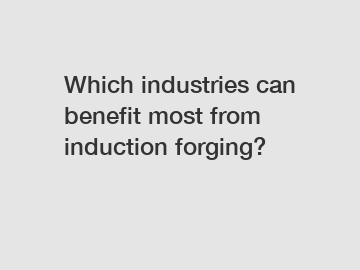Jan. 26, 2024
Machinery
Which industries can benefit most from induction forging? Induction forging offers numerous advantages for a range of industries, including automotive, aerospace, and heavy machinery.
In the automotive industry, induction forging is commonly used to create critical components such as engine and transmission parts. The process allows for precise control over the heating and shaping of metal, resulting in parts that have excellent strength and durability. Additionally, induction forging enables the production of complex geometries with high precision, which is crucial in the automotive sector where performance and efficiency are paramount.
Aerospace is another industry that can greatly benefit from induction forging. The need for lightweight yet strong components is essential in aerospace manufacturing, and induction forging meets these requirements perfectly. By using this advanced technique, aerospace companies can fabricate components that possess exceptional mechanical properties, ensuring safe and reliable performance during flight. Moreover, induction forging allows for the use of materials with superior heat resistance, which is crucial in the extreme conditions encountered in space travel.

The heavy machinery industry relies heavily on robust and durable components to withstand the rigorous demands of its applications. Induction forging provides the necessary strength and toughness required for heavy machinery operations. By utilizing this forging technique, manufacturers can produce components that exhibit exceptional wear resistance, enabling machines to operate more efficiently and last longer. Furthermore, the precise control over the heating process allows for the creation of intricate designs, optimizing the overall performance of heavy machinery.
The benefits of induction forging extend beyond the three mentioned industries. By utilizing this advanced forging technique, industries can significantly reduce material waste and energy consumption. Induction forging operates on the principle of localized heating, which minimizes heat loss to the surroundings compared to traditional forging methods. This efficiency translates into cost savings and environmental benefits, making induction forging a sustainable choice for various industries.
In conclusion, the automotive, aerospace, and heavy machinery industries can benefit greatly from induction forging. Its ability to produce high-quality, durable components with complex geometries makes it an ideal choice for these sectors. Moreover, the cost savings and environmental advantages it offers make it a compelling option for a wide range of industries. As the demand for advanced manufacturing techniques continues to grow, induction forging is poised to revolutionize the production processes in many sectors.
For more induction heating aluminum, induction heating elements, induction heating pipeinformation, please contact us. We will provide professional answers.
Previous: Is cold-pressed or expeller pressed avocado oil better?
Next: Revolutionary Steel Bar Straightener: Say Goodbye to Bent Bars!
If you are interested in sending in a Guest Blogger Submission,welcome to write for us!
All Comments ( 0 )